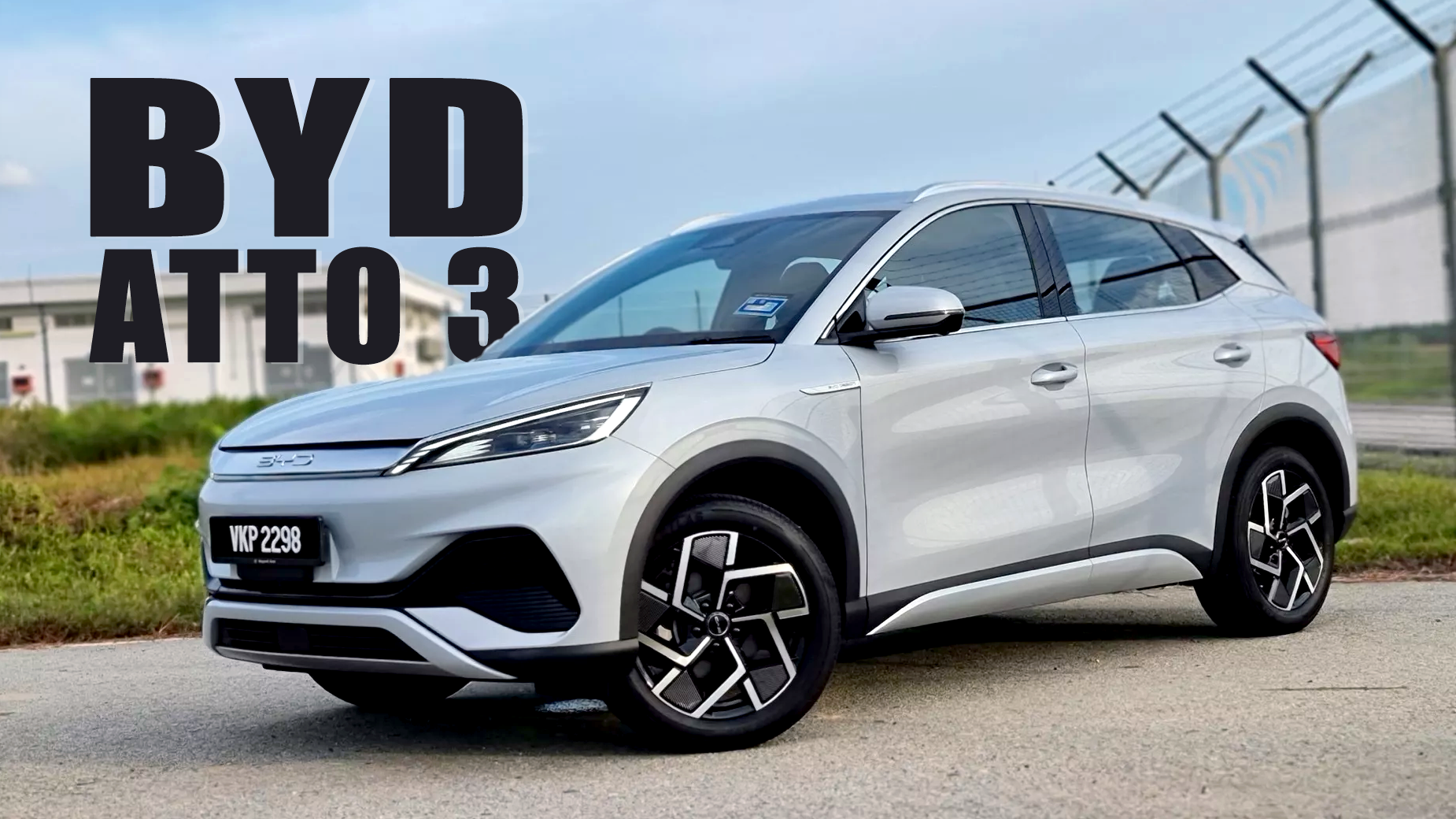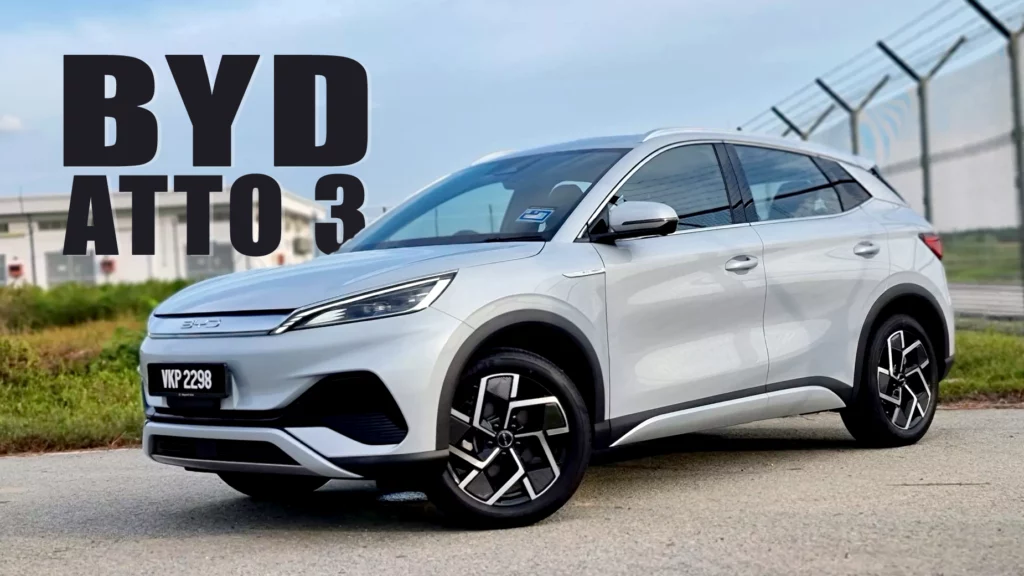
China’s BYD Atto 3 aims to be an everyday car for every person. It just so happens to be an electric vehicle underneath
3 hours ago
Seemingly overnight, BYD has managed to rocket to the forefront of the electric vehicle (EV) consciousness. And while the West has typically been dismissive, skeptical, and, in many cases, a combination of both, the world’s largest new-energy vehicle manufacturer has been making inroads on every continent.
But has BYD been able to tempt EV buyers just by virtue of its low pricing, or is there a genuinely good product to back the explosion of sales? To find out, we sampled a selection of the brand’s products in Malaysia, where the Atto 3 crossover and smaller Dolphin have been introduced to the local market.
More: Tesla Delivers 1.8 Million EVs In 2023, But BYD Closes In
On paper, the Atto 3 doesn’t exactly stand out from the current crop of EVs. It features a relatively pedestrian (by EV standards) 150 kW (203 bhp) single-motor drivetrain. It’s available coupled to either a standard or extended-range battery. The Standard Range features a 49.92 kWh battery, which the company claims to be capable of 410 km (255 miles) on the extremely generous NEDC cycle.
advertisement scroll to continue
The extended range is the version that we spent time behind the wheel of. It’s also the model offered to European consumers. It boasts a 60.48 kWh battery with a range of 480 km (298 miles) on NEDCS, which translates to 420 km (261 miles) on the WLTP cycle.
An Exterior To Dull The Senses
QUICK FACTS
The BYD Atto 3’s exterior is about as adventurous as substituting full-fat milk for two percent in your morning tea. It’s almost as if the designers set out to create an exterior that is as inoffensive as possible.
Still, it could be worse. The execution may make it look generic, but it certainly isn’t ugly. In fact, it resists the urge to ape any existing design from legacy automakers in the same way that many newcomers often fall prey to.
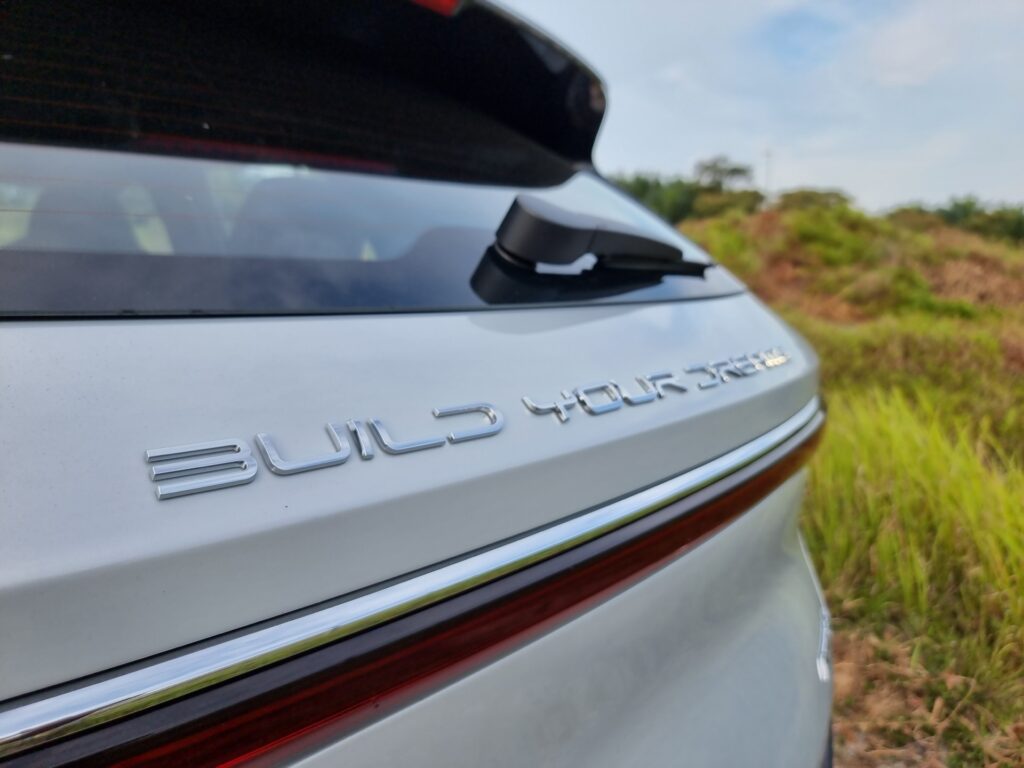
There’s also no mistaking it for anything other than an EV either. The full-width lighting up front and the grille-less look make it very “green-mobile.” But the color palette, including the signature “Surf Blue” and striking “Parkour Red” adds a dose of individuality to the outer appearance on the road and in person. Cloaked in our tester’s considerably less-racy “Boulder Grey,” the hints of flame surfacing and contrasting c-pillar are lost.
And, finally, the full-length “Build Your Dreams” text on the rear hatch will surely not be everyone — something that BYD has said it will address for certain markets in the near future.
An Interior To Excite
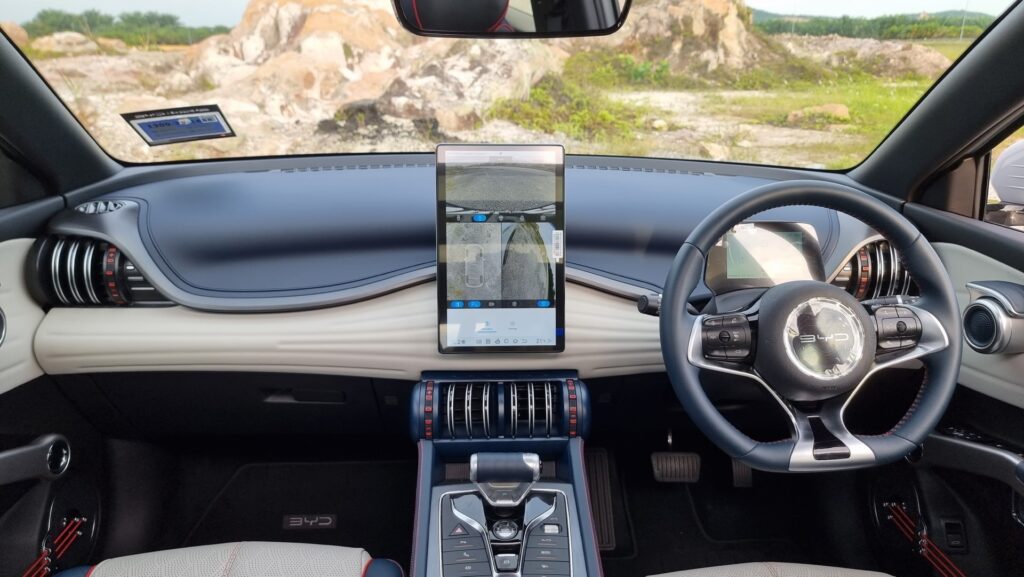
If the exterior was dull as ditchwater, the interior is like an adrenaline shot to the eyeballs. Seriously, the juxtaposition is almost uncanny, with some real creative and lateral thinking taking place inside the cabin.
To be clear, there’s a lot going on in here — and as such, it won’t be for everyone. In our opinion, it was a refreshing change to the norm — but then, I’m someone who appreciates any novel approach to interior design, with one of my favorites being the dearly departed BMW i3’s lounge-like cabin. That’s right. Judge me all you want.
Anyway, back to the BYD. The main dash has wave patterns in blue, while the air vents are supposed to mimic dumbells from a gym. Instead, they kind of feel like something you’d twist on a Tonka toy. The door handles are just as quirky — in an almost ’70s French car way. You pull back on them as if you’re opening some kind of space hatch. If nothing else, it’s amusing to time how long it takes passengers to work it out.
Another neat element are the guitar-shaped speaker grilles, with strings integrated to make up the door bins. For the musically inclined among you, said strings will even play a melody — so long as you’re able to work with just three notes.
advertisement scroll to continue
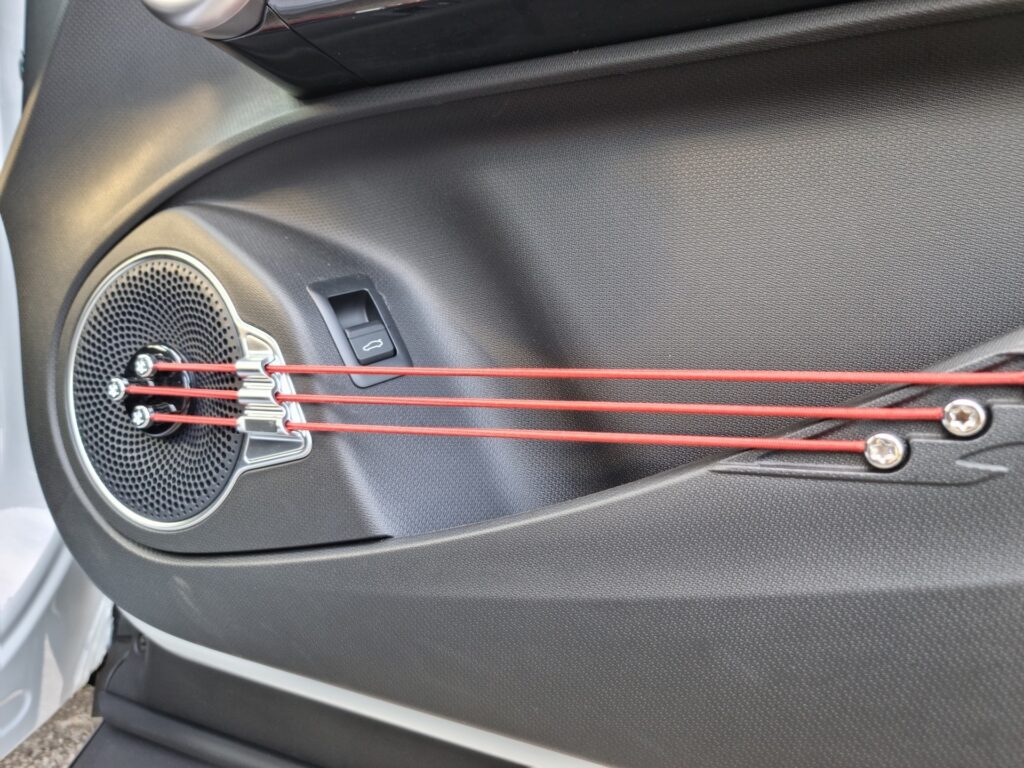
But the real party piece is the massive 15.6-inch central screen. At the press of a steering-mounted button, you can electrically swivel said screen through 90 degrees of rotation to get either portrait or landscape orientations. The real-world application is somewhat questionable — I did find myself keeping the screen in its landscape position on most days. But it’s a great conversation starter, and for those who do prefer the more upright tablet look, it’s nice to be given the option.
The car’s Android-based infotainment system is deserving of praise on its own. It successfully mimics the fluidity that any flagship phone user is used to. You have the ability to run Apple CarPlay and two applications in split screen. You also get a built-in DVR, and a range of parking cameras. There’s even a PM 2.5 filter, that allows you to monitor cabin air quality and purify it if need be — great for anyone who struggles with allergens.
There are still some complaints, however. As massive as the central screen is, it doesn’t excuse the minuscule size of the driver’s display. Vital information is crammed into it, and it fails to be anywhere near the driver’s typical line of sight, meaning you find yourself glancing down for longer than should be necessary to see the speed and battery capacity information.
Sam D. Smith / Carscoops
The lack of physical controls for the HVAC settings is a bugbear too. Especially considering there are a decent amount of buttons dotted around the cabin, precluding the Atto 3 from being a minimalist’s dream. There’s even a single button to turn the HVAC on and off, a volume wheel, and various other switches for ancillary functions. Adding temperature and fan-speed buttons would have been a useful addition that wouldn’t have impacted the interior theme.
Perhaps the biggest advantage when sitting inside, though, is the low beltline when you’re in the vehicle. You have a large glass house, which massively improves visibility, something that is desperately lacking from most modern cars. The panoramic sunroof contributes to the air of roominess, and rear seat passengers have ample room, too.
On Road Dynamics
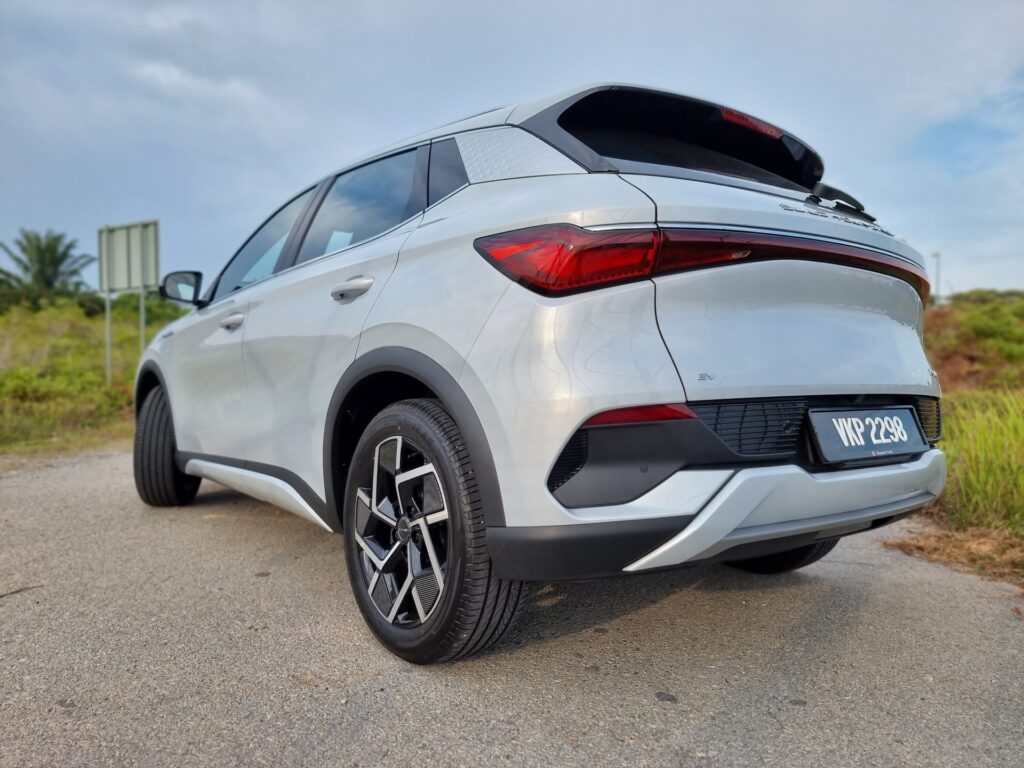
Perhaps the biggest element of the BYD Atto 3’s driving experience is how un-EV-like it feels on the road. That’s both a compliment and a drawback. The downside is that if you’re expecting the instant, push-you-into-the-seatbacks burst of torque that is commonly associated with EVs, you’ll be sorely disappointed.
Instead, the throttle application is damped almost too well to disguise the driving experience as very ICE-like. That’s not to say there are lags in power delivery, but that the arrival of power and speed is restrained enough to mimic an ICE’s more gradual delivery. In many ways, this approach makes a great deal of sense for the Atto 3’s target audience — with a great deal of first-time EV buyers being courted by BYD.
Like the throttle application, similarly, the steering, although a tad uncommunicative, never feels overtly light even in its “comfort” mode. You’re not going to mistake it for some kind of Porsche Macan rival, but it doesn’t feel toy-like, either. There’s a great deal of maturity engineered into the feel behind the wheel.
Read Also: BYD Seal Arrives In Europe With Up To 523 HP And 354 Miles Of Range
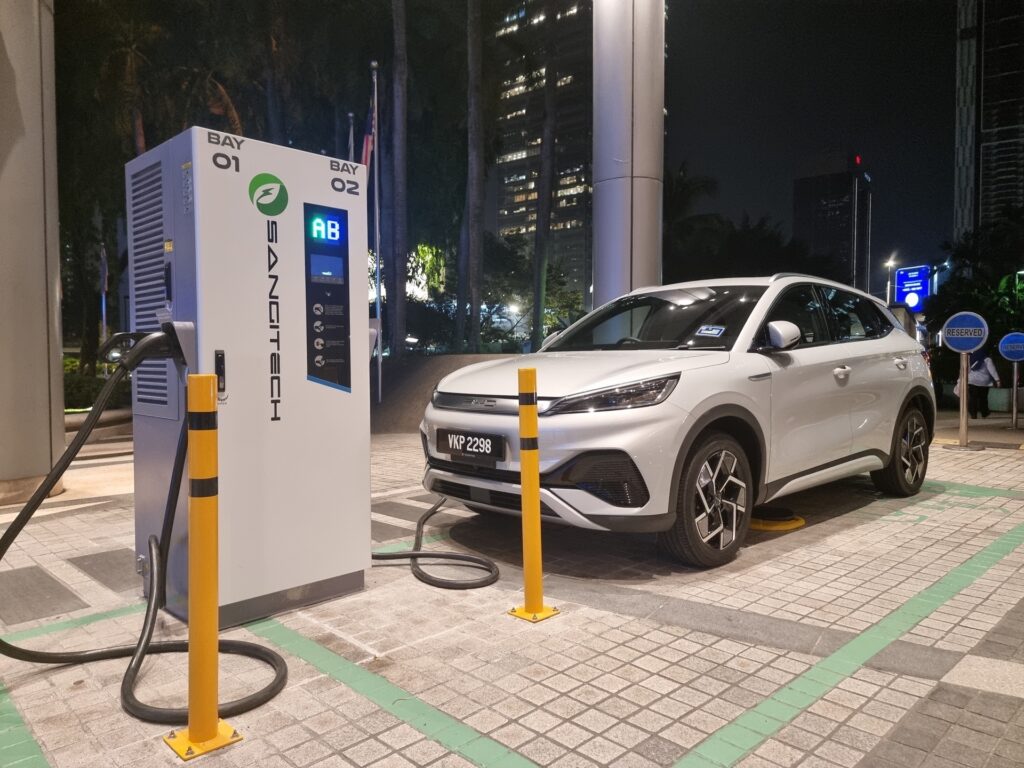
The chassis, too, feels decent enough when hustled. But the factory-fitted “Atlas Batman” tires belie its true potential. They are loud at highway speeds and lack the grip and confidence required to fully exploit the Atto 3.
The suspension is another pain point, which, with a few tweaks, could propel the Atto 3 even further ahead of the class. The current set-up is just too cushy for its own good. While being excellent at absorbing speed breakers and potholes, it suffers from excessive rebound and wallow. At highway speeds, that translates into excessive bouncing over expansion joints, while on corners, you’ll find yourself almost on the door handles. European-tuned this is not and could be something that the BYD engineering team would do well to rectify in any future iteration.
Overall, we were left impressed at how well the BYD Atto 3 has managed to score. Despite a relatively low cost of entry, it provides a refined and relaxed driving experience in the EV space, offering a package that is on balance and on par with more established players.
Those Electric Gubbins
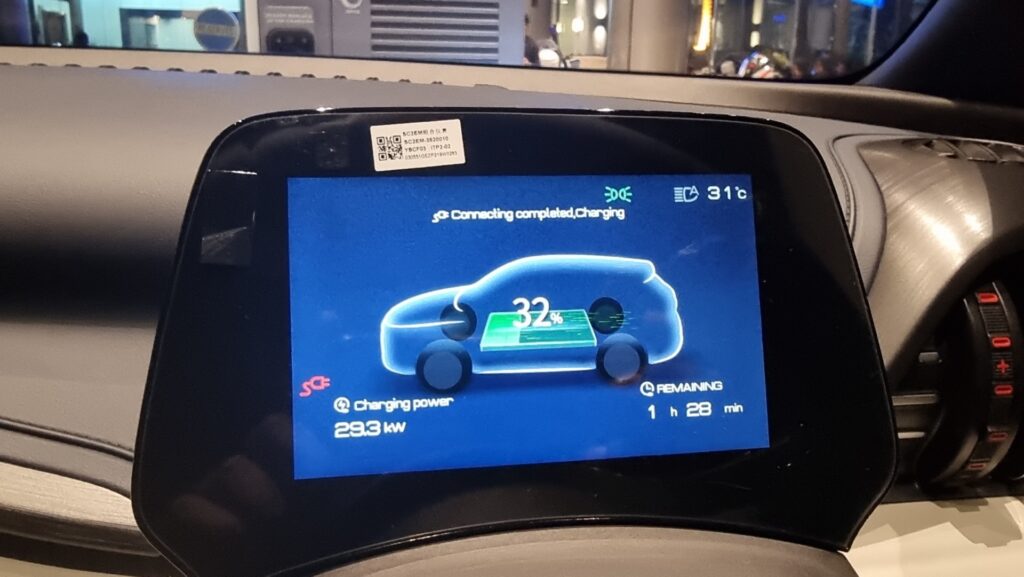
While BYD has been busy making headlines as it muscles in on Tesla’s sales numbers, it still remains a pretty unknown brand to most in the West. This is a shame because some of the tech they’re employing under the skin is ahead of many competitors.
For example, BYD’s “Blade” battery is a more cost-effective approach to one of the most expensive components of an electric car. The Blade battery’s cells use lithium, iron, and phosphate (LFP), which is actually less energy-dense than the lithium manganese cobalt electrodes that virtually every other EV manufacturer uses. While that may sound less advantageous, the materials used in LFP batteries are less toxic and are also cheaper. BYD can get away with these less energy-dense electrodes thanks to the Blade battery’s cells being directly in the main case rather than being separate cells in modules.
In terms of driving range, the displayed range of 480 km (298 miles) on a 100 percent charge was surprisingly accurate, with the range staying consistent throughout a week’s testing on mixed highway and city driving conditions.
Although we only needed one top-up, the recharge we made was straightforward enough at one of Malaysia’s ChargeSini 60 kW DC chargers, which got the Atto 3’s battery from 35 percent to 90 percent in 44 minutes. BYD claims the Extended Range Atto 3 can accept up to 80 kW of DC power, while charging at home, the EV will accept 7 kW from a domestic AC plug or 11 kW from its three-phase onboard charger. In the future, we’re hoping to test out the range claims in a more scientific manner over much greater distances. Watch this space for that!
So What’s The Verdict?
For all intents and purposes, the BYD Atto 3 is a massive step forward for the brand. Having driven a BYD e6, a previous-generation minivan that felt more in its infancy as a polished product, the Atto 3 is right up there with what you’d expect in this segment.
That’s to say, you shouldn’t expect the most luxurious or engaging drive experience. After all, this is a consumer-centric offering. But the Atto 3 at no point feels cheap. Nor does it feel like an experiment. Yes, the interior is a touch wacky, and the swiveling screen is bound to impress passengers for at least 30 seconds of small talk. But, at the same time, you can tell that the engineers have dialed out most of what makes NEV fence-sitters scared of new tech. As a result, much of the fun has also been washed away. But again, when it’s competing against rivals from MG, Kia, and Hyundai, the BYD Atto 3 offers plenty of reasons to be liked.
Could it benefit from slightly better chassis control? Absolutely. What about the road noise? Well, that’s a simple fix that we’re told is rectified by many owners switching to name-brand EV-specific tires — and is certainly something that should be offered off the showroom floor. How about a touch more range? That certainly wouldn’t hurt either. But as a “my first EV” offering, the BYD Atto 3 makes a lot of sense to a lot of people. And it’s not hard to see why it’s winning over as many fans as it is already.
